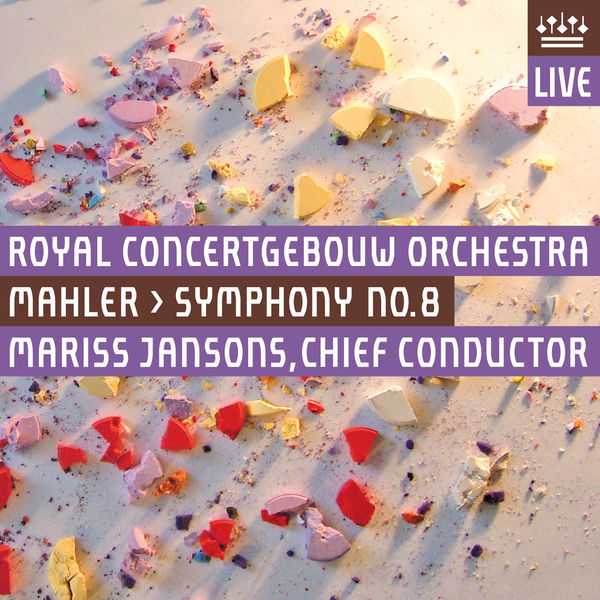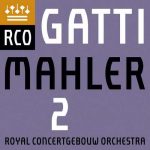

Composer: Gustav Mahler
Performer: Christine Brewer, Camilla Nylund, Maria Espada, Robert Dean Smith, Tommi Hakala, Stephanie Blythe, Stefan Kocan, Mihoko Fujimura, Netherlands Radio Choir, Latvian State Choir, Chor des Bayerischen Rundfunks, Netherlands National Children’s Choir, Netherlands National Boys Choir
Orchestra: Royal Concertgebouw Orchestra
Conductor: Mariss Jansons
Format: FLAC (tracks)
Label: RCO Live
Catalogue: RCO13003
Release: 2013
Size: 1.31 GB
Recovery: +3%
Scan: cover
Symphony No. 8 in E-Flat Major, “Symphony of a Thousand”
Part 1
01. I. “Veni, creator spiritus”
02. II. “Imple superna gratia”
03. III. “Infirma nostri corporis”
04. IV. “Accende lumen sensibus”
05. V. “Veni, creator spiritus” (II)
06. VI. “Gloria sit Patri Domino”
Part 2
07. I. “Waldung, sie schwankt heran”
08. II. “Ewiger Wonnebrand”
09. III. “Wie Felsenabgrund mir zu Füssen”
10. IV. “Gerettet ist das edle Glied”
11. V. “Uns bleibt ein Erdenrest … Hier ist die Aussicht frei”
12. VI. “Höchste Herrscherin der Welt”
13. VII. “Dir, der Unberührbaren”
14. VIII. “Bei der Liebe die den Füssen”
15. IX. “Neige, neige, du Ohnegleiche”
16. X. “Komm! Hebe dich”
17. XI. “Blicket auf zum Retterblick”
18. XII. “Alles vergängliche”
Mariss Jansons and the Royal Concertgebouw Orchestra recorded Gustav Mahler’s Symphony No. 8 in E flat in 2011, and this 2013 release presents that live rendition in the hybrid SACD format, with bonus audiovisual recordings included, either on DVD or Blu-ray disc. There’s a lot to consider about this package, for the “Symphony of a Thousand” can be appreciated as a purely musical experience and as a fascinating concert film, and both media present aspects of the work that add to a deeper understanding of Mahler’s achievement. However, this performance lacks the richness of ensemble sound and presence that other multichannel recordings of the Eighth provide, and the audio is similar to a high-quality conventional CD. Jansons gets a satisfying performance from the eight vocal soloists, five choirs, and the orchestra, and his interpretive choices are cautious but adequate to communicate Mahler’s expressions. But this thoughtful performance doesn’t feel transcendent, and the singing and playing never rise to ecstatic heights. Furthermore, there are sections in Part II where Jansons’ exertions are quite noticeable, and this can be distracting to attentive listeners. Considering the increasing number of excellent recordings on the market in this audiophile format, this Eighth is ranked in the second tier and should be heard before purchasing.
“Try to imagine the whole universe beginning to ring and resound. There are no more human voices, only planets and suns revolving in their orbits,” wrote Gustav Mahler to his friend, Willem Mengelberg, on 18 August 1906. The day before, he had completed the sketches of the Eighth Symphony in little more than three weeks, and that after a very hectic season.
The legendary relationship between Gustav Mahler, the Royal Concertgebouw Orchestra and Willem Mengelberg has established a firm tradition of playing Mahler in Amsterdam. During the 1960s the orchestra and Bernard Haitink started recording a Mahler discography that still remains one of the cornerstones of any Mahlerian’s collection. Ricccardo Chailly’s tenure as chief conductor yielded another brilliant Mahler cycle and now Mariss Jansons is steadily building his tribute to the composer.
Recorded during the same Mahler cycle as the recently released Symphonies Nos. 2 and 3 – part of the full Mahler cycle that the orchestra performed in the 2009-2011 seasons to celebrate the composer’s 150th birthday and 100th anniversary of his death – Mariss Jansons’s interpretation of the Eight Symphony is one more jewel in the crown of the Royal Concertgebouw Orchestra; with a star-studded cast and excellent choral forces, this ‘Symphony of a Thousand’ left a lasting impression on the audience.



